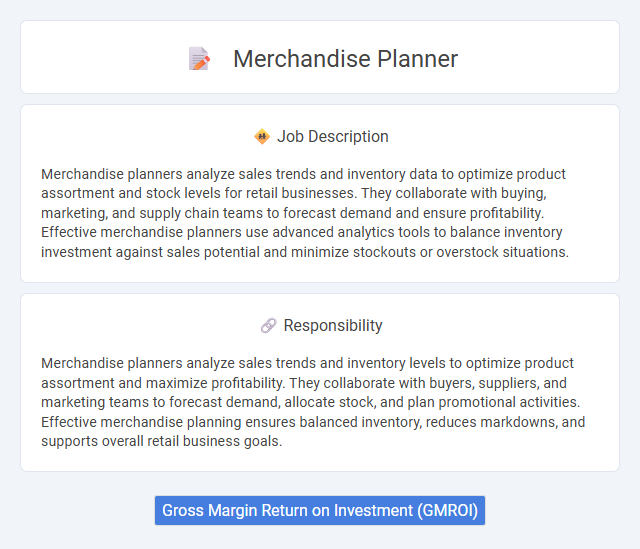
Merchandise planners analyze sales trends and inventory data to optimize product assortment and stock levels for retail businesses. They collaborate with buying, marketing, and supply chain teams to forecast demand and ensure profitability. Effective merchandise planners use advanced analytics tools to balance inventory investment against sales potential and minimize stockouts or overstock situations.
People who exhibit strong analytical skills and an interest in market trends are likely suitable for a merchandise planner role. Those comfortable with data analysis, forecasting, and managing inventory fluctuations may find this job aligns with their strengths. Individuals preferring routine and minimal pressure might not thrive, as the position often requires adapting to dynamic retail environments.
Qualification
A Merchandise Planner must possess strong analytical skills, proficiency in inventory management software, and a solid understanding of retail trends and consumer behavior. Relevant qualifications typically include a degree in business, finance, or supply chain management, alongside experience in demand forecasting and sales analysis. Effective communication and negotiation abilities are crucial for coordinating with vendors and cross-functional teams.
Responsibility
Merchandise planners analyze sales trends and inventory levels to optimize product assortment and maximize profitability. They collaborate with buyers, suppliers, and marketing teams to forecast demand, allocate stock, and plan promotional activities. Effective merchandise planning ensures balanced inventory, reduces markdowns, and supports overall retail business goals.
Benefit
A Merchandise planner likely improves inventory accuracy and reduces overstock risks, potentially enhancing profitability for retail businesses. They might optimize product assortments based on sales data trends, increasing customer satisfaction and sales efficiency. This role could provide opportunities for career growth in supply chain and retail management through strategic decision-making insights.
Challenge
Merchandise planners likely face the challenge of accurately forecasting demand in highly volatile markets, which can impact inventory levels and sales performance. The complexity of balancing stock availability with budget constraints may require continuous data analysis and strategic adjustments. Managing supplier relationships and responding to sudden market trends probably add to the dynamic and demanding nature of the role.
Career Advancement
Merchandise planners analyze sales data and inventory levels to optimize product assortment and maximize profitability. Mastery in demand forecasting and vendor negotiation enhances opportunities for roles such as merchandise manager or retail buyer. Proficiency in data analytics tools and supply chain coordination significantly accelerates career progression in retail management.
Key Terms
Gross Margin Return on Investment (GMROI)
Merchandise planners use Gross Margin Return on Investment (GMROI) to evaluate the profitability of inventory by measuring the gross margin earned for every dollar invested in stock. They analyze sales data and inventory turnover rates to optimize ordering decisions, ensuring high GMROI while minimizing overstock and markdowns. Effective GMROI management drives financial performance by aligning product assortment with market demand and maximizing return on inventory investment.
 kuljobs.com
kuljobs.com